| Srl | Item |
| 1 |
ID:
121720
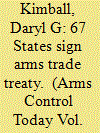

|
|
|
|
|
| Publication |
2013.
|
| Summary/Abstract |
Senior diplomats from 67 European, Latin American, Asian, and African states signed the Arms Trade Treaty (ATT) at the United Nations on June 3.
|
|
|
|
|
|
|
|
|
|
|
|
|
|
|
|
| 2 |
ID:
115590
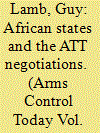

|
|
|
| 3 |
ID:
107373
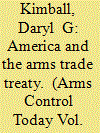

|
|
|
|
|
| Publication |
2011.
|
| Summary/Abstract |
Each year, thousands of civilians around the world are slaughtered by weapons sold to unscrupulous regimes and transferred to criminals and illegal militias. The enormous human toll of this cycle of violence undermines economic development and political stability in fragile regions.
|
|
|
|
|
|
|
|
|
|
|
|
|
|
|
|
| 4 |
ID:
097189
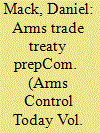

|
|
|
| 5 |
ID:
127862
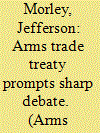

|
|
|
|
|
| Publication |
2013.
|
| Summary/Abstract |
A senior State Department official last month defended the Arms Trade Treaty, signed by the U.S. government in September, after 50 senators wrote to President Barack Obama saying they would oppose the pact. In the Oct. 15 letter, the senators charged that the treaty undermines U.S. credibility, threatens the rights of gun owners, and impinges on U.S. sovereignty. The lawmakers said they "cannot give [their] advice and consent to this treaty" and "do not regard the U.S. as bound to uphold its object and purpose."
|
|
|
|
|
|
|
|
|
|
|
|
|
|
|
|
| 6 |
ID:
115749
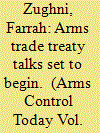

|
|
|
| 7 |
ID:
115588
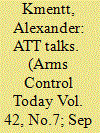

|
|
|
| 8 |
ID:
122621
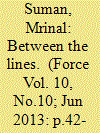

|
|
|
| 9 |
ID:
115592
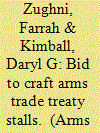

|
|
|
| 10 |
ID:
115928
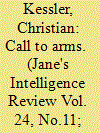

|
|
|
| 11 |
ID:
089860
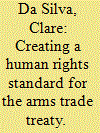

|
|
|
|
|
| Publication |
2009.
|
| Summary/Abstract |
This papaer will focus on the relationship between international human rights law and state authorization of conventional arms transfers and describe a workable human rights standard for arms transfer that could be included in an ATT.
|
|
|
|
|
|
|
|
|
|
|
|
|
|
|
|
| 12 |
ID:
111987
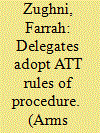

|
|
|
| 13 |
ID:
155704
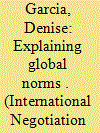

|
|
|
|
|
| Summary/Abstract |
International norms are central to world politics and they set boundaries for what is deemed commonly accepted behavior. The literature has not effectively explained the rise of new norms through negotiation and how actors from the Global South have played active roles, especially in the complex areas of developing security norms. This article argues that norm-making is not a unidirectional movement or phenomenon, but rather a highly circuitous process. The circuitous norm building model accounts for an increasing connectedness among domestic and regional/international levels in norm building in Global South and North countries.
|
|
|
|
|
|
|
|
|
|
|
|
|
|
|
|
| 14 |
ID:
115577
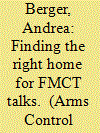

|
|
|
| 15 |
ID:
135247
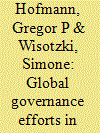

|
|
|
|
|
| Summary/Abstract |
This article focuses on the role of justice claims for issues of global governance. Conflicting justice convictions held by states can become considerable stumbling blocks for multilateral negotiations. Normative claims which call for strengthening individual rights, such as human rights or human security, often collide with statist sovereignty convictions, such as the right of non-intervention, territorial integrity and non-interference. Conflicts between negotiating parties also occur on questions of distribution, recognition and procedural justice. The article argues that such justice conflicts affect the outcome of negotiations. Two recent negotiation processes and governance efforts at the United Nations are examined: the Responsibility to Protect (2005) and the Arms Trade Treaty (2013).
|
|
|
|
|
|
|
|
|
|
|
|
|
|
|
|
| 16 |
ID:
110597
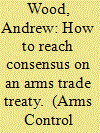

|
|
|
|
|
| Publication |
2012.
|
| Summary/Abstract |
Since 2006, government representatives to the United Nations have been engaged in progressively wider and deeper discussions toward the negotiation of a treaty to regulate the trade in conventional arms. In 2009 the UN General Assembly decided to convene a conference that established a timetable for crafting an arms trade treaty (ATT), which is to be "a legally binding instrument on the highest-possible common international standards for the transfer of conventional arms.
|
|
|
|
|
|
|
|
|
|
|
|
|
|
|
|
| 17 |
ID:
138337
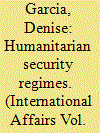

|
|
|
|
|
| Summary/Abstract |
This article introduces a novel concept, humanitarian security regimes, and enquires under what conditions they arise and what is distinctive about them. Humanitarian security regimes are driven by altruistic imperatives aiming to prohibit and restrict behaviour, impede lethal technology or ban categories of weapons through disarmament treaties; they embrace humanitarian perspectives that seek to prevent civilian casualties, precluding harmful behavior, protecting and ensuring the rights of victims and survivors of armed violence. The article explores how these regimes appear in the security area, usually in opposition to the aspirations of the most powerful states. The existing regimes literature has mostly taken a functional approach to analyzing cooperation, lacks a humanitarian hypothesis and does not explore the emergence of new regimes in the core area of security. The author argues that in the processes of humanitarian security regime-making, it is the national interest that is restructured to incorporate new normative understandings that then become part of the new national security aspirations. This article intends to fill this gap and its importance rests on three reasons. First, security areas that were previously considered to be the exclusive domain of states have now been the focus of change by actors beyond the state. Second, states have embraced changes to domains close to their national security (e.g. arms) mostly cognizant of humanitarian concerns. Third, states are compelled to re-evaluate their national interests motivated by a clear humanitarian impetus. Three conditions for the emergence of humanitarian security regimes are explained: marginalization and delegitimization; multilevel agency, and reputational concerns.
|
|
|
|
|
|
|
|
|
|
|
|
|
|
|
|
| 18 |
ID:
107779
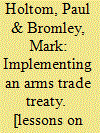

|
|
|
|
|
| Publication |
Sweden, SIPRI, 2011.
|
| Description |
vii, 42p.
|
| Series |
SIPRI policy paper no. 28
|
| Standard Number |
9789185114658
|
|
|
|
|
|
|
|
|
|
|
|
Copies: C:1/I:0,R:0,Q:0
Circulation
| Accession# | Call# | Current Location | Status | Policy | Location |
| 056280 | 382.456234/HOL 056280 | Main | On Shelf | General | |
|
|
|
|
| 19 |
ID:
101268
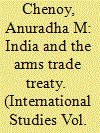

|
|
|
|
|
| Publication |
2010.
|
| Summary/Abstract |
The Arms Trade Treaty (ATT) seeks to regulate the transfer of conventional arms on the principle that arms exporters and importers have a responsibility to ensure that weapons are not used in violations of international law. India wants the ATT to be limited to illicit trade. It believes that the United Nations has various mechanisms to deal with human rights violations and that this issue should not be linked to arms trade. Indian citizens have spoken against gun vio-lence. Whether it is against the guns that killed Jessica Lall in Delhi or people in the conflict zones of Manipur, Kashmir or the Maoist-affected regions, Indians are fighting against the menace of the gun culture. The ATT is a just cause and India needs to support it.
|
|
|
|
|
|
|
|
|
|
|
|
|
|
|
|
| 20 |
ID:
192884
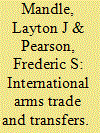

|
|
|
|
|
| Summary/Abstract |
The end of the Cold War era has ushered in a century in which great military powers like the US, China, and Russia continue to dominate the arms trade, yet minor powers are also investing heavily in arms manufacturing and technologies and profiting from lucrative arms transfers. Changes in the arms trade have fostered cooperative international regulatory practices and agreements, but recent conflicts in Yemen, Syria, Libya, Nagorno-Karabakh, and Ukraine highlight the need for strong end-use monitoring, post-shipment verification, and international accountability for dubious trade deals. This study analyzes changes in top arms producers, new complexities in arms regulation due to advancing technologies and artificial intelligence, arms-control policies of international organizations and top arms producers, and the risks of poor regulation.
|
|
|
|
|
|
|
|
|
|
|
|
|
|
|
|